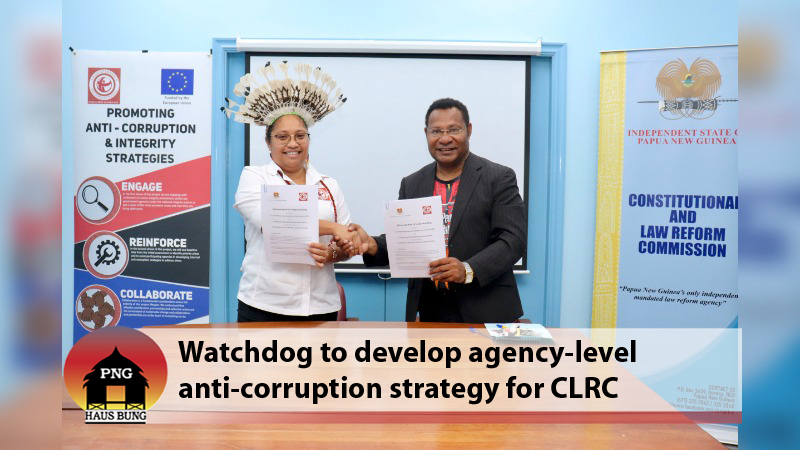Transparency International Papua New Guinea (TIPNG) and the Constitutional and Law Reform Commission (CLRC) earlier this week in Port Moresby have signed a Memorandum of Understanding (MoU) to develop an agency-level anti-corruption strategy for the CLRC.
This initiative is part of TIPNG’s Promoting Anti-Corruption and Integrity Strategies (PAIS) Project funded by the European Union to strengthen public trust in national integrity institutions.
“TIPNG commends the leadership demonstrated by the CLRC in signing an MoU to develop an agency-level anti- corruption strategy.
This decision speaks to the foresight of the Commission in ensuring that it is further equipped to fulfil its constitutional role.
It is auspicious that this signing is happened on the eve of Independence Day when all Papua New Guineans should reflect on their patriotic duty to oppose corruption wherever it occurs.
To that end, the CLRC has a vital mandate to safeguard the integrity of our National Constitution, so that the rule of law is not compromised in our country.
As a key part of the legislative consultation process, the CLRC ensures that laws in Papua New Guinea are of the people, by the people, and for the people,” said Chief Executive Officer of TIPNG, Ms. Arianne Kassman in a media statement.
CLRC’s mission is to provide the Government with high level, independent advice on the Constitutional Laws and other law review and reform activities, and the state of the laws, as well as to promote community awareness and understanding of laws and the legal system in Papua New Guinea.
The CLRC has a special constitutional responsibility to monitor the development of the Underlying Law and provide regular reports to the Parliament on the appropriateness of the application of the Underlying Law principles (Schedule 2.14 of the Constitution).
In addition to this, the CLRC Chairperson is tasked to refer any decisions of the lower courts, which may be inconsistent with the proper development of the Underlying Law, to the National Court, as set down in Sections 8 and 13 of the Underlying Law Act 2000.
TIPNG through the PAIS Project will be working with state agencies to develop internal anti-corruption strategies in 2021, that will be shared with citizens and journalists so that they can more effectively engage with the public sector to take action against corruption.
This work has been informed by TIPNG’s 2021 National Integrity System Assessment (NISA) Report which found that all 14 National Integrity pillars in PNG were less than adequate.
Furthermore, the NISA identified a clear integrity gap between the existing laws and practice by agencies.
The internal anti-corruption strategies developed by TIPNG in partnership with selected agencies will go towards bridging this integrity gap.

